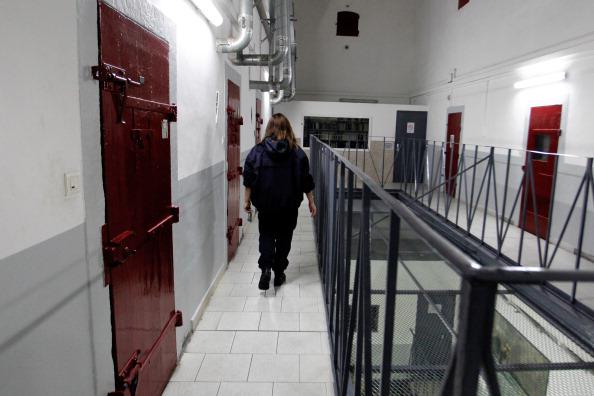On Wednesday, I wrote about the Baltimore City Detention Center, and how it had been effectively taken over by a prison gang called the Black Guerrilla Family (BGF). Recently, 25 people, including 13 prison employees, were indicted for their alleged roles in the BGF’s robust drug business and other criminal enterprises. Those 13 corrections officials were all female, which surprised me—I had assumed that men were only guarded by other men. But, as it turns out, female guards are relatively common in men’s prisons.
The Civil Rights Act of 1964, among its many stipulations, prohibits employment discrimination based on gender, and this applies as much to prisons as it does to white-collar office work. Why would a woman want to work at a men’s prison? As law professor John Dwight Ingram wrote in his paper “Prison Guards and Inmates of Opposite Genders,” it’s all about job availability. “Because there are far more male inmates in prison than there are females, in most states there are only one or two women’s facilities. If women can only guard women, there will be fewer jobs open to women, and it may well be that none of those that are available will be near the guard’s home,” Ingram explains. Makes sense; I hate to commute, too.
That’s not to say that female guards in men’s prisons have an easy time of it. Women are generally smaller and less strong than men, which can be a problem if you are working in a physically intimidating environment with aggressive men who might want to have sex with you. That happens more often than you might think. As a 2010 AP article reported, a 2007 Justice Department study “analyzing the prevalence of sexual assault in state and federal prisons found that 58 percent of staff perpetrators of sexual misconduct were female.” (No matter the circumstances, the staffer is always said to have committed misconduct if he or she has sex with an inmate.)
Indeed, some of the indicted Baltimore prison guards had intimate relationships with BGF members. Tavon White, an alleged BGF leader, reportedly impregnated four guards, two of whom tattooed his name onto their bodies.* This wasn’t the first time that Maryland correctional personnel had become involved with BGF members. It happened a few years ago, too, as the Baltimore City Paper’s Edward Ericson Jr. and Van Smith reported in 2009, after the AG’s office indicted 24 alleged BGF members on relatively similar charges:
A guard named Takevia Smith texted [alleged BGF leader Eric] Brown sexually explicit photos of herself on or about Feb. 24, and later spoke openly about prostituting herself in the prison kitchen. She quit after getting searched for contraband, saying on a wiretapped phone call: “That job be cool while it lasted. But that shit like having a McDonald’s job, I got to break the law to get money.”
The Baltimore situation sounds laughable, sure. But when you think about how these encounters probably went down—inside the walls of that crowded, mismanaged jail—it’s not funny at all. As the AP story reported, “While many [of these sexual encounters] could be considered consensual, incarceration experts and female prison guards say the problem is much more complicated. In some cases, the women reported that they couldn’t say no to the inmate out of fear, or were afraid to go to a co-worker out of shame at what had happened.”
Stories like this are almost always more complicated than you’d think. Earlier this year, a New York guard named Nancy Gonzalez was in the news after she was impregnated by an imprisoned cop killer named Ronell Wilson. “She’s a traitor to every badge,” said the New York Post. But one of her former co-workers, Keishada Leftwich, told the New York Daily News that the situation was not as clear-cut, and that female guards were routinely harassed by staff and inmates alike. “The male COs (correction officers) tell the inmates about their relationships with staff and talk to inmates about ‘hitting that,’ ” Leftwich said. “That makes the inmates less afraid to cross the line (with a female staffer).”
The issue, ultimately, isn’t that female prison guards have no place in men’s prisons. It’s that prisons are terrible places that are often overcrowded and poorly managed, in which the strong will prey on the weak if they are allowed to do so. And that’s unlikely to change no matter who’s on guard.
*Correction, April 29, 2013: This post originally misidentified Tavon White as Tavon Smith.
